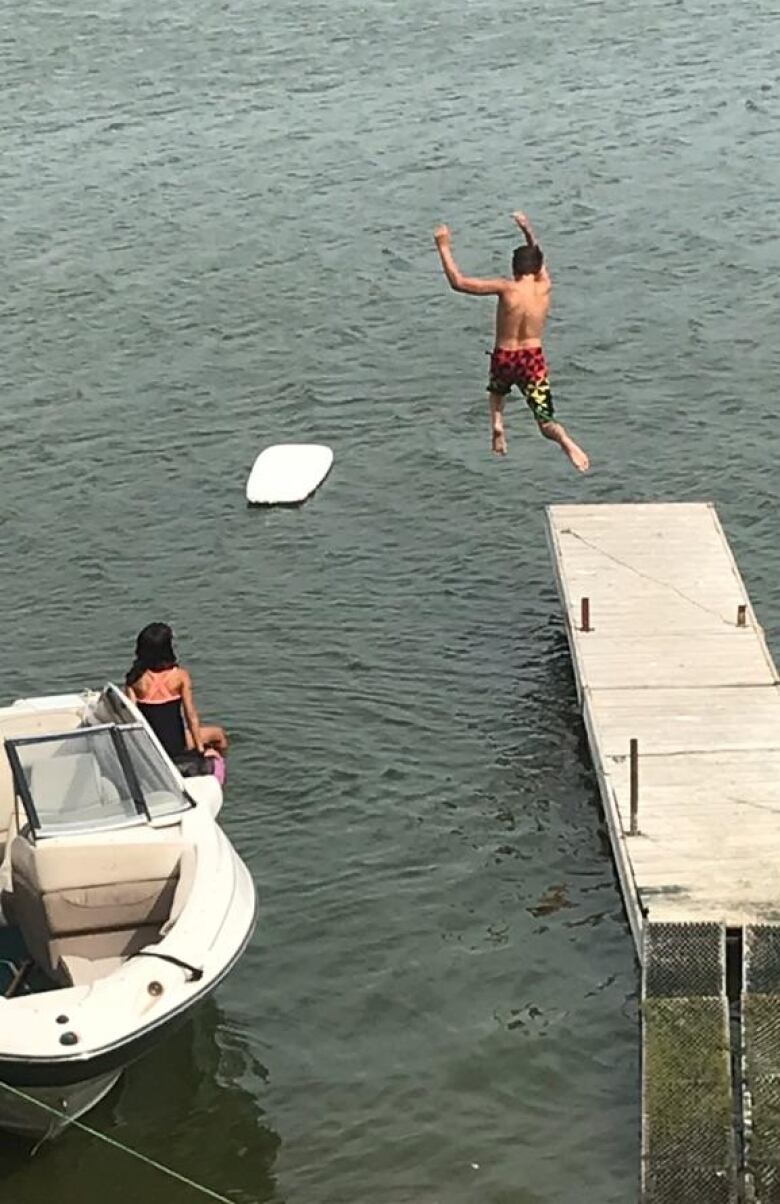Family evicted from waterfront lot after dispute with First Nation over unpaid lease
Lease terminated because of rental arrears

A dispute over unpaid lease costs for waterfront property on a Saskatchewan First Nation has led to a family being told to destroy their cottage or remove it from the land it has sat on for generations.
Elaine Ashfield's family has a cottage on Lot 17 at Grenfell Beach on Crooked Lake. The land is owned by the Sakimay First Nation. Elaine Ashfield's husband Clifford leased the land, like his father and grandfather had.
Elaine has looked after the estate since Clifford`s death in 2011. Her son Brian now calls it home.

Indigenous Services Canada (ISC) terminated the lease effective May 25 and told the Ashfields to restore the land to its natural state. That means destroying or moving the home and removing additions like a septic tank and a retaining wall.
The Ashfields expect representatives from Sakimay First Nation and Indigenous Services Canada to inspect the property Tuesday.
Elaine said she can't fathom leaving.
"Our family has leased that property since World War Two and it's been passed down from one generation to the next," she said.
"Basically as of the 24th, we will sit there until the police arrest us and tell us we are trespassing."
According to the Indian Act, "a person who trespasses on a reserve is guilty of an offence and liable on summary conviction to a fine not exceeding fifty dollars or to imprisonment for a term not exceeding one month or to both."
Eviction brought on by outstanding payments
Chief Lynn Acoose said the lease was terminated because the Ashfields haven't kept up with payments.
"It's unfortunate that people didn't pay their rent and so now they're facing eviction," she said.
"We have some long-time tenants, like the Ashfields, who we know have really appreciated our land, but the fact of the matter is we can't let people just remain on our land without paying."
Acoose said that sets a dangerous precedent for other tenants.
"Our hands were tied."
Acoose said that if the property isn't restored the First Nation will have to remediate the property and then bill the former tenant.
Acoose said about 30 leasers were sent termination notices similar to the Ashfields. She said some of the leasers came in and paid before the final notice was issued and their leases were not terminated.
Raised Rents
Cottagers have been unhappy with Sakimay First Nation for years.
Hundreds of cottagers previously launched a class action lawsuit after rent was raised — some as high as 700 per cent.
The changes came after Sakimay First Nation commissioned an independent appraisal done on the land.
The rented land is designated to be leased and must be leased for fair market value, Acoose said.
"There's no guidance on whether we can adjust the land values according to our tenants."
Acoose said the First Nation wanted to improve its standards, and needed revenue to do so.
"We realized that Sakimay needed to change. We needed to ensure that we get the highest and best use from our land."

Acoose said bringing rent up to market value was one way to do that.
The Ashfield lease was subsequently raised from $460 per year to $4,692, or $391 per month.
Ashfield said the last time they paid money to the Sakimay First Nation was in 2010 because after that they were involved in the class-action lawsuit.
"The lawyer for the beach association recommended that we do not pay leases," she said. Ashfield said that lawyer was Kevin Bell, who works out of Melville. He did not return CBC's request for comment.
Ashfield said she received a registered letter from Indigenous Services Canada in December that said the lease would be terminated if arrears weren't paid in full by the end of the month.
Ashfield said she contacted the Sakimay First Nation land office to have the the lease put in her son's name and to request an extension for payment.
"We agreed that we would pay what they were asking for, but we just needed a little time to finance it — but they never responded," she said.
Ashfield said she doesn't understand why the land office didn't take her money. She tried contacting ISC about the dispute. In an email response from ISC, which Ashfield shared with CBC, ISC said it, "does not have any information pertaining to an attempt to pay the rental arrears."
On May 25, she received a letter that said the land must be remediated. In an email, ISC told Ashfield it was prepared to grant an extension to Aug. 23 to remediate the retaining wall. However, the extension would only be for clean up.
"My term for a lot of this is expropriation," Ashfield said.
Sakimay introduces Basadinaa Property Management
Acoose said she does worry that what has transpired with the cottagers could affect public perspective of the First Nation. She wants to see "a consistent and fair process for setting rent in future."
It's why it has created Basadinaa Property Management Ltd., a corporate entity to to handle lease and land agreements.
She's hopeful this can foster better relationships between tenants and the First Nation, and relieve the chief and council from having to make decisions about rent guided by the Indian Act.
Sakimay First Nations has worked with Indigenous Services Canada to restructure how the land is leased, and Basadinaa Property Management Ltd. will take over sub-leasing of recreational plots in 2019.
"We want to get on with the task of transforming our governance at Sakimay," she said.
"With our new lease regime, I'm hoping we can just get on with the business of governing."
